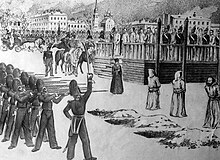
Back رابطة بيتراشيفسكي Arabic Petraševci Czech Petraschewzen German Círculo Petrashevski Spanish حلقه پتراشفسکی Persian Cercle de Petrachevski French חוג פטרשבסקי HE Պետրաշևականներ Armenian Circolo Petraševskij Italian Петрашевский тобу Kirghiz
Petrashevsky Circle Петрашевцы | |
|---|---|
 Petrashevsky Circle's members going through an 'execution ritual', an example of a mock execution. St. Petersburg, Semionov-Plaz, 1849. B. Pokrovsky's drawing | |
| Leader | Mikhail Petrashevsky |
| Founded | 1845 |
| Dissolved | 1849 |
| Headquarters | Saint Petersburg |
| Ideology | Utopian socialism |
| Political position | Left-wing |
The Petrashevsky Circle was a Russian literary discussion group of progressive-minded intellectuals in St. Petersburg in the 1840s.[1] It was organized by Mikhail Petrashevsky, a follower of the French utopian socialist Charles Fourier. Among the members were writers, teachers, students, minor government officials and army officers. While differing in political views, most of them were opponents of the tsarist autocracy and Russian serfdom. Like that of the Lyubomudry group founded earlier in the century, the purpose of the circle was to discuss Western philosophy and literature that was officially banned by the Imperial government of Tsar Nicholas I. Among those connected to the circle were the writers Dostoevsky and Saltykov-Shchedrin, and the poets Aleksey Pleshcheyev, Apollon Maikov, and Taras Shevchenko.[2]
Nicholas I, alarmed at the prospect of the revolutions of 1848 spreading to Russia, saw great danger in organisations like the Petrashevsky Circle. In 1849, members of the Circle were arrested and imprisoned. A large group of prisoners, Dostoevsky among them, were sent to Semyonov Place for execution. As they stood in the square waiting to be shot, a messenger interrupted the proceedings with notice of a reprieve. As part of a pre-planned intentional deception, the Tsar had prepared a letter to general-adjutant Sumarokov, commuting the death sentences to incarceration. Some of the prisoners were sent to Siberia, others to prisons. Dostoevsky's eight-year sentence was later reduced to four years by Nicholas I.
- ^ Evans, John L. The Petraševskij Circle 1845-1849. The Hague: Mouton, 1974.
- ^ Lenin: Plan of Letters on Tasks of the Revolutionary Youth